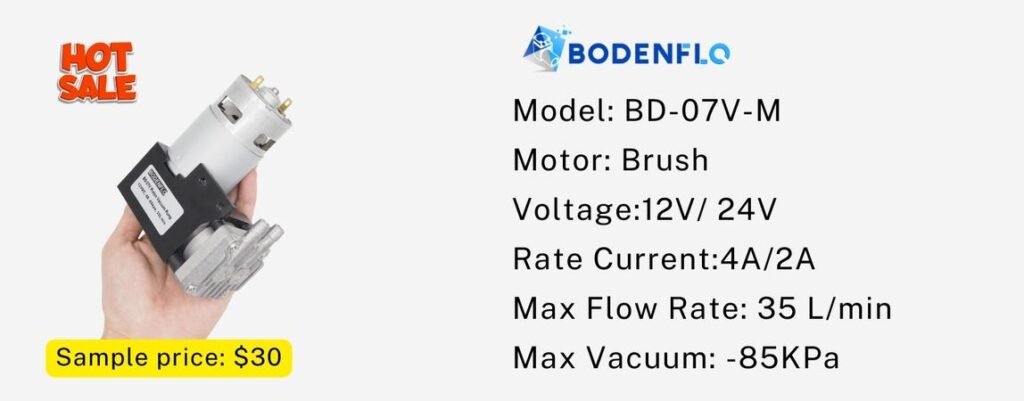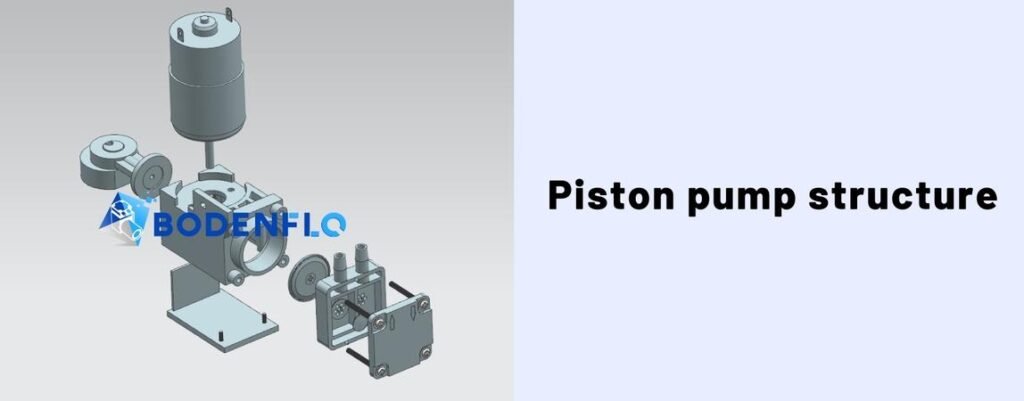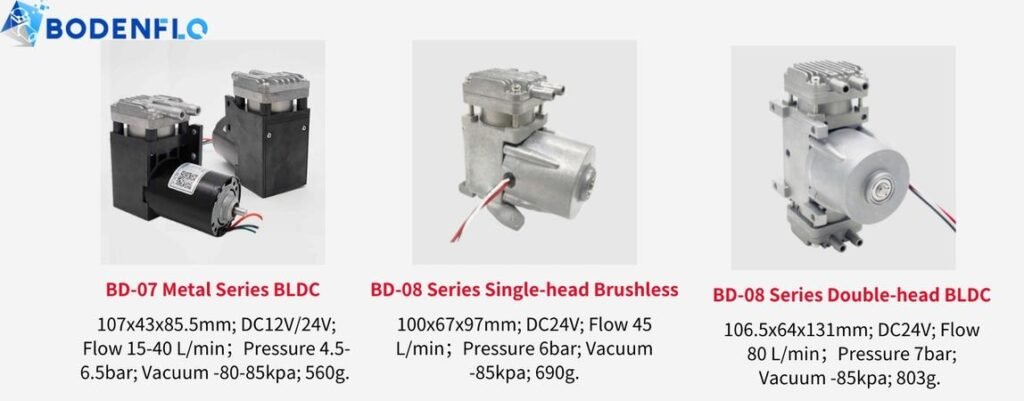
Confused about how piston pumps function? Curious about the variations and what sets a miniature piston pump apart? As a product manager at BODENFLO, with years of expertise in this field, I can assure you that understanding piston pumps is not only intriguing but critical for various applications.
Piston pumps, whether designed for gases or fluids, operate on the principle of creating a vacuum or pressure in a chamber through the motion of a piston. Their versatility and effectiveness make them indispensable in numerous applications.
If you’re looking to deepen your understanding of this fascinating machinery, stay tuned.
What Is a Vacuum Piston Pump?
Understanding Vacuum Generation
The primary role of a vacuum piston pump is to create a vacuum—essentially an area of low pressure—within a chamber. By doing so, it sets the stage for the transfer of gases from a high-pressure area to a low-pressure one. This generation of a vacuum is a nuanced process, relying on the precise movement of a piston within a sealed chamber.
Versatility in Applications
Unlike general small piston pumps, vacuum piston pumps specialize in moving gases, not liquids. This makes them extraordinarily versatile in a range of applications. From the medical field, where they’re used in respiratory devices, to industrial setups requiring gas transfer or vacuum creation, these pumps are invaluable. They offer an unparalleled performance, especially when it comes to generating high levels of vacuum, often necessary for sensitive operations.
High Vacuum Capabilities
A standout feature of vacuum piston pumps is their ability to produce very high vacuum levels. This is possible due to the tight seal and the piston’s precise movements in the chamber. This capability is particularly crucial in scientific research settings or medical procedures that require a high degree of vacuum. The high vacuum levels ensure that gases are moved effectively and efficiently, meeting the stringent requirements of various applications.
Customizable Features
It’s worth noting that vacuum piston pumps can also be customized according to specific needs. For example, at BODENFLO, we offer parametric customization to meet the requirements of unique vacuum levels, flow rates, and other specifications. This adaptability ensures that the pump fits seamlessly into whatever application it’s intended for.
By gaining a comprehensive understanding of what a vacuum piston pump is and how it differs from other types of piston pumps, you can make an informed decision that aligns with your specific needs. Whether it’s the capability to produce high vacuum levels, versatility in applications, or customizable features, vacuum piston pumps are designed to excel.
The Role of 12V Piston Pumps
Ideal for Low-Voltage Settings
One of the defining features of 12V piston pumps is their ability to operate effectively in lower voltage environments. Unlike their higher-voltage counterparts, these pumps are engineered to run efficiently at 12 volts, making them the go-to choice for scenarios where electrical input is limited.
Automotive and Portable Applications
The 12V feature is particularly advantageous in automotive settings, such as vehicle-based water pumps, fuel pumps, or air suspension systems. They are not just confined to cars; these pumps are also ideal for boats, RVs, and other mobile units. Their low-voltage requirement makes them an excellent fit for portable uses as well, be it in battery-operated sprayers or portable washers.

Efficiency and Compact Design
While they operate at a lower voltage, 12V piston pumps don’t compromise on performance. They offer a level of efficiency comparable to high-voltage pumps, thanks in part to their compact design and optimized engineering. This efficiency makes them cost-effective and energy-saving, aligning well with the demand for sustainable solutions.
By understanding the unique features and benefits of 12V piston pumps, one can see how they fill a specific niche in lower voltage, automotive, and portable applications. Their efficiency and adaptability make them an essential tool in a variety of settings.
Why Miniature Piston Pumps Are Essential
Space-Saving Design
One of the most salient features of miniature piston pumps is their compact size. In today’s ever-shrinking devices and systems, real estate is precious. These pumps are specifically designed to fit into tight spaces, whether it’s within medical equipment, portable devices, or compact industrial systems. Despite their small size, they do not compromise on capability.
Versatile Customization
Miniature piston pumps offer a high degree of customization, another reason they are increasingly popular. Depending on the specific requirements, these pumps can be tailored to handle either gases or liquids. Their adaptability extends to varying pressure and flow rates, enabling them to serve in diverse applications ranging from lab instrumentation to HVAC systems.
Consistent High Performance
Don’t let their size fool you; these pumps pack a punch when it comes to performance. They are built to deliver consistently high output, making them just as effective—if not more so—than some of their larger counterparts. The high performance combined with their compact design makes them ideal for systems where both space and functionality are crucial considerations.
Miniature piston pumps are an essential component in a wide variety of applications due to their compact form factor, customization options, and high performance. Their versatility and efficiency make them a go-to choice for engineers and designers alike.

Understanding the Piston Vacuum Pump Working Principle
The Basic Mechanism
In a piston vacuum pump compressor, the fundamental mechanism revolves around the motion of a piston within a cylinder. As the piston retracts, it enlarges the chamber’s volume, reducing the internal pressure and creating a vacuum. This vacuum allows for the intake and movement of gases into the chamber. When the piston pushes forward, it compresses and expels the gases, completing the cycle.
High Vacuum Generation
One of the standout features of piston vacuum pumps is their capability to produce a high degree of vacuum. Unlike other pump types, piston vacuum pumps excel in achieving lower pressures, making them highly efficient for applications that require a strong vacuum.
Versatile Applications
Thanks to their efficiency in creating high vacuums, piston vacuum pumps find usage in diverse sectors. Whether it’s in the medical field for respiratory systems or industrial applications for material handling, their reliability and performance are unparalleled.
Advantages of Efficiency
The ability to generate a high degree of vacuum not only broadens their applicability but also enhances their overall operational efficiency. Less energy is wasted, making them a cost-effective solution for both short-term and long-term projects.
Understanding the working principle behind piston vacuum pumps involves recognizing their basic mechanism, their aptitude for creating high vacuums, and their broad range of applications. Their efficiency rounds off their profile, making them an excellent choice for various vacuum requirements.

The Advantage of Small Electric Piston Vacuum Pumps
Compact Size for Flexible Deployment
One of the most significant benefits of small electric piston vacuum pumps is their compact form factor. These pumps can fit into tight spaces, providing maximum flexibility for integration into various systems. Whether you’re working in a confined industrial setup or need a portable solution, their small size ensures they can be deployed with ease.
Electrical Operation for Easy Integration
Unlike other types of pumps that might require specialized power sources, these piston vacuum pumps are electrically operated. This feature simplifies their integration into existing electrical systems, reducing both time and costs involved in setup.
Efficient Gas Movement
Despite their small size, these pumps are highly efficient at moving gases. Their piston mechanism allows them to create a high degree of vacuum, similar to larger piston pumps, but in a more compact design. This makes them suitable for applications that require efficient gas handling without the bulk of a larger pump.
Versatility Across Applications
Thanks to their small form factor and electrical operation, these pumps are incredibly versatile. They can be easily adapted for use in medical devices, laboratory setups, automotive systems, and various other applications requiring a reliable vacuum source.
Small electric piston air vacuum pumps offer the advantages of compact size, easy electrical integration, efficient gas movement, and high versatility, making them an excellent choice for a wide range of applications.
Conclusion
To sum it up, understanding the types and working principles of piston pumps, especially those designed for gases like vacuum piston pumps or versatile options like miniature piston pumps, can significantly influence your application’s success. I hope my insights, backed by my experience at BODENFLO, have clarified this subject for you.



